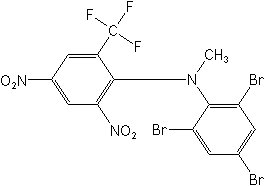Molecular formula for Bromethalin (for more information):

Q: I heard that there is a newer rat poison on the market that is very lethal to dogs and cats. My sister’s friend had a dog that ate some on their farm and died. Have you heard about this product, and how can I keep my dogs safe from accidentally eating some?
A: There is a newer chemical making up rat poison now called bromethalin. It was introduced to protect nontargeted species — like man and companion animals — from the traditional rat poison that worked by stopping the victim’s blood from clotting, therefore causing death in several days due to massive hemorrhage.
Bromethalin does not have anything to do with blood or clotting in order to kill rodents. It is a neurotoxin that is rapidly absorbed from the GI tract, gets broken down and crosses the blood-brain barrier. Once there, it causes water to infiltrate into nervous tissue and results in cerebral edema. The animals will become unsteady within as little as 2 to 4 hours after ingesting bromethalin and have tremors, vomit and become depressed. After all this, fever and seizures develop, which ultimately leads to death.
There are some huge problems with this product that have become evident since its introduction in the late 1980s. There is no test to diagnose it. With the older poisonings, we could do a clotting profile and gauge how aggressively or if treatment was needed at all after a possible rat poison ingestion. Then, if needed, vitamin K could be given to treat the clotting abnormalities that were to develop and to save the pet.
Unfortunately, the only way to diagnose a bromethalin toxicity is to have an owner physically see their pet eat the substance. Then, as far as treatments go, there is no antidote. Vitamin K does not work.
If vomiting can be induced at home within 10 to 15 minutes, chances of survival are better. For any time frame longer than that, a veterinary professional needs to induce vomiting and start using multiple oral doses of activated charcoal to try to absorb the chemical from the system. At best, the chances of survival are minimal.
Some products that contain bromethalin are under the name of FastTrack and Talpirid Mole Bait, Protecta and JT Eaton. In addition to being three-times as strong as older rat poisons, bromethalin puts not only rats at risk for death but people, and of course dogs and cats and other wildlife are in danger if this product is ingested.
The companies recommend gloves when handling it and to always use the bait trap to contain the product. They never recommend people remove the chemical from the traps and scatter it about for anything to ingest. Even inhalation of the product can be dangerous.
I think the best way to keep your pets safe from this product is to not have it around your pets, your family and your home. There are several other ways to rid your environment of unwanted pests with traps and good hunting predators, such as cats and fast dogs. Professional exterminators are always an option, too.
And always know what is around your house or the place you are staying. I had a client who once took her dog to a cabin with her for a weekend getaway in the forest. Well, guess what was under the bed? A container of rat poison. And guess who ate it? The dog.
Luckily, this was several years ago, and she scooped up her pet and the container of rat poison (it’s important to know what they ate from a veterinary point of view for treatment purposes) and brought both of them to the hospital. We were able to effectively treat the clotting issues of the older-style rat poison with vitamin K successfully, and all worked out well.
So please be vigilant with your pets and know the dangers that are all around them. Try to think ahead and not get taken by surprise by an unforeseen toxicity or danger. This is good advice that I like to follow not only for my pets but now for my teenagers, too. I’m that mom. Good luck and have a safe summer travel season with furry and non-furry family.
Send questions for Dr. Allison Dascoli to “Ask the Vet,” Charleston Gazette-Mail, 1001 Virginia St. E., Charleston, WV 25301 or email them to askthevet@wvgazettemail.com. Comments or suggestions can be submitted the same way.
*Original article online at https://www.wvgazettemail.com/life/columns/ask_the_vet/ask-the-vet-how-can-i-keep-my-pets-safe/article_3181a54c-0e03-5636-b1e0-817044375cd3.html
